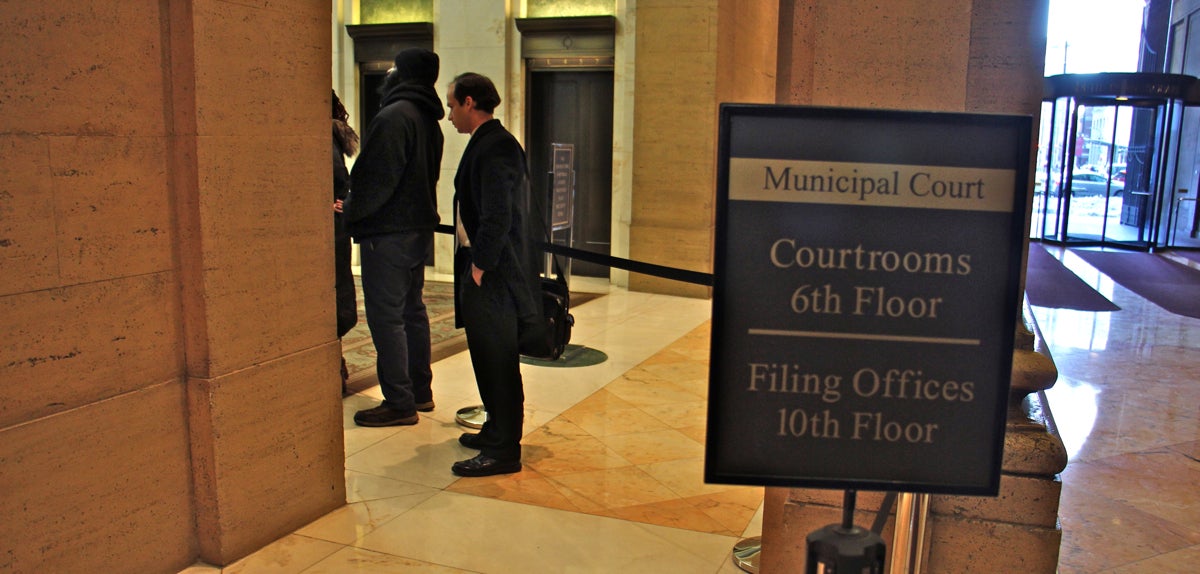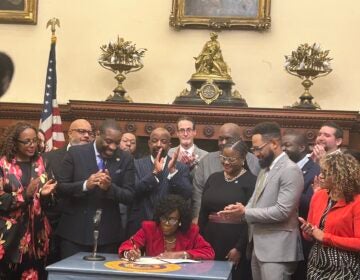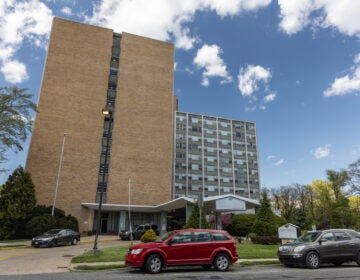To reduce unfair evictions, tenants need lawyers

In a city with a staggeringly high eviction rate, landlord-tenant court is one of the busiest corners of Philadelphia’s municipal judiciary.
To get to the court, walk into the lobby of the century-old Widener Building at 13th and Chestnut, past the interior windows displaying the white-tablecloth dining at Fratelli’s Italian Bistro, to the battery of elevators. Then head up to the sixth floor.
There are no windows in the drab entrance to landlord-tenant court, which bears the hallmark fluorescent lighting and stained carpeting of municipal bureaucracies everywhere. Bored-looking police officers watch over the metal detectors, which are separated from the public by a small barrier studded with signs exhorting visitors, “PLEASE READ Under NO circumstances are BEDBUGS or ANY BUGS permitted in this building as evidence!!!”
The humble setting belies the importance of the proceedings. If a tenant ends up with an eviction on their record, their rental choices are narrowed, often relegating them to poorer neighborhoods. That’s bad for renters and for the city, too. The persistent churn created by an eviction rate of this level destabilizes poor neighborhoods and breaks apart social networks. Social scientists who study the phenomenon believe violence and despair are the result.
The courtroom itself is usually packed. Like much of the rest of the country, Philadelphia renters struggle with stagnant wages and rising housing costs. (In the U.S., one in four poor renter households spend more than 70 percent of their income on housing.)
“The problem in Philadelphia, and across the country is that people have financial problems and trouble paying their bills,” says Kenneth Baritz, who has represented mostly landlords in rental disputes for decades. “It’s not because the landlord is a bad guy, or the tenant is a bad guy. It’s just a sad reality…The ramifications of that can be devastating, but I’m not sure there is a way around that.”
The ten rows of benches, half facing northward and half westward, are full of supplicants—many are tenants and most of them unrepresented. In 2016, 22,573 cases were filed in landlord-tenant court. In almost 92 percent of those cases the tenants represented themselves.
“Once you do get involved with the courts, it’s very expensive to get an attorney,” says Michelle Blain, a renter who recently won a case against a negligent landlord. “Most people don’t want to deal with it so they just leave [the court] and have evictions on their credit. It shouldn’t have to be that way.”
Blain’s landlord rented her an apartment where the heat didn’t work, the kitchen had no stove, and, as she later discovered, there were mold and mildew problems. Pregnant at the time, she tried to pressure him into getting the problems fixed to no avail. Then she called the Department of Licenses and Inspections, which issued multiple violations. Nothing ever changed, so she stopped paying rent. Then the landlord filed an eviction notice.
Because Blain had a newborn child, she lucked into a legal aid lawyer provided by the Philadelphia Nurse-Family Partnership. With help secured for free, she fought the case—and won, when her lawyer discovered that her landlord hadn’t followed the city’s lead law.
Most renters who enter the Widener Building aren’t so lucky, and the stakes are higher than many realize. With an eviction on your record, acquiring rental housing elsewhere becomes far more challenging. Even a small monetary judgment, which means tenants are left with a court-enforceable debt, will weigh down a tenant’s credit score. Future landlords will find it when using common tenant-screening background checks, and avoid drawing up a lease for anyone with that kind of blemish on their rental history. Getting public assistance from the public housing authority becomes difficult, too, because evictions count against applicants in that venue as well.
This is why the lack of legal representation is troubling for many advocates. According to data compiled by Philadelphia Legal Assistance, access to legal aid is only available to approximately 1.5 percent of renters. The remaining 6.7 percent are represented by for-profit attorneys doing pro bono work (or occasionally representing tenants who can afford it). By comparison, 81 percent of landlords have legal representation.
But the average tenant is unprepared to effectively argue their own case in court, especially against a professional lawyer. Most tenants do not know that the law is on their side if a landlord lacks a rental license or is out of compliance with lead paint regulations. Without all the necessary paperwork in order, property owners are prohibited from asking for rent when they are out of compliance with those laws.
Because Blain had a lawyer on her side, she knew her landlord didn’t have the lead safety paperwork in order and won her case. But she knows that isn’t the norm for people in her situation.
“Everyone should be licensed and coded, but no one is watching the owners,” said Blain. “It’s crazy. If you are a tenant and you have a problem, you go straight downtown. But they don’t have someone to advocate for you. They [the landlords] are just getting away with it.”
If the tenants make it before a judge, Philadelphia Legal Assistance data from 2016 shows the case ends in their favor about a third of the time. But going before a judge is the exception. Of the more than 22,500 cases that came to landlord-tenant court in 2016, only 1,332 came before a judge.
Without legal help, many tenants end up agreeing to a settlement, or judgment-by-agreement (JBA), which allow the two sides to settle on terms quickly, and hopefully to mutual benefit, instead of putting themselves at the mercy of a judge.
“Nine times out of ten we reach judgment by agreement and we do that because going in front of a judge always represents some risk,” says Ethan D. Fogel, a partner with Dechert LLP, a major law firm that does pro bono tenant-side work. “If the landlord’s lawyer can do a deal instead of going in front of the judge, they are usually willing to give us a better deal than we would have gotten if the judge was absolutely fair.”
But if one of the sides isn’t backed by a lawyer, the results aren’t so evenhanded.
“If a tenant isn’t represented, you end up with a real disparity of power and information,” says Fogel. “Even if the landlord counsel is absolutely ethical about it–and we think the ones we deal with generally are—the tenants don’t understand what their defenses are and end up with a bad deal.”
In the adversarial American legal system, it simply isn’t the job of the landlord’s lawyer to be fair to a tenant. The judge is meant to be the neutral arbiter between the two contesting forces. But that balance only works if both sides have a lawyer and there is no guarantee of legal representation in civil cases. For Fogel the power imbalance between property owners and renters, who are often low-income, seems very stark.
A day in landlord-tenant court begins at 8:45 in the morning. After the litigants file into the large courtroom, their cases are called one by one. If someone isn’t there when their name is called, a default judgment is leveled against them, which happens in about 30 percent of each day’s cases. Another round kicks off at 12:45 p.m.
After the roll call, everyone settles in to wait because the judge doesn’t start considering cases for another hour or more. It’s during this lull in the action that the two sides are instructed by the court to try and work out a deal.
When that happens the two contestants walk into a large room just to the south of the courtroom, which is lined with posters depicting iconic buildings and vistas of Philadelphia. Here the judgments by agreement are hammered out. The results cannot be appealed.
“[Recently] we saw an uptick in tenants coming in after signing a JBA, really confused about what they signed,” says Rasheedah Phillips, managing attorney in Community Legal Services’ Housing Unit. “The way the courtroom is set up is pure chaos. They have one hundred people gathered around waiting and they don’t know who to talk to and they don’t know who is the lawyer for who. There’s a lot of confusion and a lot of intimidation.”
Due to the lobbying of tenant-side lawyers like Phillips, signs have been posted in the meditation rooms—where parties go if both are unrepresented—to inform tenants that signing the agreements offered by the mediators isn’t mandatory. But that does little for those who are faced with a landlord backed by a lawyer.
Blain would like to see something more intensive done for her fellow renters.
“No matter what the amount of money is, or what the situation may be [in these cases], the city of Philadelphia has to do something,” says Blain. “The city and the mayor, they just can’t let [landlords] go without having a license. You can’t just go out and rent out a place. They have to make sure it’s suitable and they have to have proper licenses. There’s no accountability whatsoever.”
Councilwoman Helen Gym, for one, seems to agree. She introduced a resolution calling for hearings about substandard housing, “landlord-tenant concerns,” and the right to counsel. In New York City, Mayor Bill DeBlasio recently began guaranteeing lawyers to renters in landlord-tenant court. Advocates like Phillips would like to see something similar in Philadelphia.
From the perspective of the landlord-side lawyer Kenneth Baritz, the tenant court isn’t skewed in favor of any particular group. If tenants don’t show up in court, that’s their own fault. If they need a housing lawyer, he notes that firms like Community Legal Services exist. Told about the right-to-counsel proposal, Baritz expressed skepticism that the city of Philadelphia could afford such a program.
“More than likely you [tenants] would be better served,” says Baritz. “If it could be made available in one way or another, sure, it would be great. But is this pie in the sky? It really might be better, but that doesn’t mean we are going to get it.”
On the afternoon of March 20, the City Council’s committees on Licenses & Inspections and Public Health & Human Services will jointly hear testimony on the issue. Across the street, at around the same time, the judge at municipal court will settle in to decide the cases of those who didn’t sign a judgment by agreement at landlord-tenant court.
WHYY is your source for fact-based, in-depth journalism and information. As a nonprofit organization, we rely on financial support from readers like you. Please give today.







